Taipingtianguo Zhongwang Mansion (太平天国忠王府/Taiping Heavenly Kingome King Zhong’s Mansion) is located on Northeast Street in Suzhou, just next to the famous Zhuozheng Garden. It was the royal residence of Li Xiucheng, also known as the King of Loyalty, who was one of the key figures in the Taiping Heavenly Kingdom. In fact, it’s the most complete royal residence from the Taiping period still standing today. In Chinese history, it’s also the best-preserved mansion of a peasant rebel leader.
The story of this place starts in 1860 when Li Xiucheng led the Taiping Army and captured Suzhou. From October that year, the Taiping forces began converting the Wu family’s Zhuozheng Garden into the Zhongwang Mansion. They even expanded the grounds by incorporating neighboring houses, including the Pan and Wang family estates. This transformation created a vast complex—official offices, courtyards, and even gardens—all sprawled out over a considerable area.
By December 1863, though Suzhou had fallen and the mansion was still under construction, the complex was already beginning to take shape. After the Taiping Army withdrew from the city, Li Hongzhang, a prominent Qing official, used this very mansion as the administrative headquarters for Jiangsu Province.
Table of Contents
- Basic Information
- Location and Transportation
- Highlights of the Mansion
- Attractions near Tianpingtianguo Zhongwang Mansion
Basic Information
| Estimated Length of Tour | 1 hour |
| Ticket Price | Free |
| Opening Hours | 9.00 – 17.00; Last admission: 16.00 |
| History | 1860: Built as the residence of Zhongwang as he conquered Suzhou 1863: Occupied by Li Hongzhang after Zhongwang was defeated 1872: Converted into a guild house 1946: Converted into a school 1960: Converted into a museum |
| Telephone Number | 0086-0512-67575666 |
Location and Transportation
Nestled amidst the scenic landscapes of Suzhou, the Taipingtianguo Zhongwang Mansion commands attention as a historical and architectural masterpiece. This grand mansion is strategically situated within Suzhou’s urban fabric, harmoniously blending into the city’s rich tapestry of culture and history. Its exact address is No. 204, Northeast Street, Gusu District, Suzhou, Jiangsu Province, China. To get there, you can choose the following ways:
Bus: Take bus 5, 9009, 9016, 9025, or 9029, get off at Suzhou Museum Stop (苏州博物馆站), and walk about 200 meters to the north to reach the mansion.
Metro: The nearest metro station to the Humble Administrator’s Garden is North Temple Pagoda (Beisita 北寺塔) on line 4. After getting out of the station from Exit 4, walk about 800 meters to the east to reach the mansion.
Highlights of the Mansion
Woqiu Hall

Woqiu Hall is situated in the eastern part of the Zhongwang Mansion, and it’s a very special place. You’ll notice a beautiful wisteria garden in front, and behind it, there’s a traditional theater hall. Now, there’s a lovely story tied to this hall. The owner of Zhuozheng Garden, Wang Xianchen, had a strong bond with some of the most prominent scholars and artists of the time, like Wen Zhengming, Tang Yin, and Zhu Yunming. These men would often gather here, especially in the middle of spring when the wisteria was in full bloom. Wang would host banquets for his friends and colleagues, and this area became known as “Woqiu Hall.” The name “Woqiu” comes from the wisteria vines that twist and turn like a dragon – symbolizing the noble scholars who chose a life of quiet, seclusion.
Classical Theater Stage

the Classical Theater Stage is another remarkable feature of the mansion, also located on the eastern side. It was originally built within the South Four-Courtyard, which was part of the Eight Banners Fengtang Hui Guan. Despite several rounds of renovations, the stage has largely preserved its original look. In fact, it’s one of the best-preserved indoor classical theater stages in the country! It’s huge – 450 square meters – and the ceiling soars to nearly 10 meters in height. What’s really impressive is the span of the roof, which stretches 14.8 meters. Around the roof’s eaves, there are 47 flip windows to let in light, which adds to the charm of the space. It’s as if you’re stepping into a place that has witnessed countless performances through history.
Siheyuan (Courtyard House)

The Siheyuan is in the second section of the Eastern Road buildings, just behind the Classical Theater Stage. It was built to suit the living habits of the Banner people, who were part of the Qing Dynasty military elite. It’s really a fantastic example of Beijing’s royal courtyard style, transplanted right here into Jiangnan, which is quite rare. The columns are painted a rich vermilion red, while the window grilles are a deep, elegant green. It gives the entire courtyard a majestic, almost regal feel, and it’s not something you would expect to see here in a water town like Suzhou! The total area of the Siheyuan is a whopping 720 square meters – so it’s quite a large space to explore and enjoy.
He Xuan (Crane Pavilion)

Now, if you walk over to the western part of the mansion, you’ll come across the He Xuan, or “Crane Pavilion.” This building is a true gem with its three-bay structure, and it gets its name because the walls are made of nanmu wood, which is prized for its fine texture and fragrance. You’ll hear it called “Nanmu Hall” or sometimes “Flower Hall”—both names capture the essence of this space. What’s particularly charming about He Xuan is its front courtyard, which is separated from the building by a tall, imposing wall. The wall itself is quite decorative, with five different styles of vent windows, giving it a very unique character. The courtyard has a serene, almost magical atmosphere, with small stone mounds scattered about that make the whole place feel quiet and contemplative.
Suzhou-Style Decorative Painting

The Suzhou-style decorative paintings in Zhongwang Mansion are absolutely extraordinary! These paintings are not only plentiful but also remarkably high in artistic quality, making them quite rare, even in all of China. About three-quarters of these paintings feature stunning landscapes, flowers, birds, animals, and gorgeous intricate patterns. And the best part is, many of these motifs have deep meanings, like wealth, happiness, longevity, and prosperity. For example, there are bats representing good fortune (“Quan Fu”), deer for wealth (“Bai Lu”), and even bees and monkeys symbolizing noble titles (“Feng Hou”). It’s all about good vibes and wishes for the family and the kingdom!
In total, 343 panels of decorative paintings have been preserved, with 323 being the original works from the Taiping era. The rest were altered in later years. The survival of these paintings offers a rare glimpse into the intricate artistic culture of the time
















